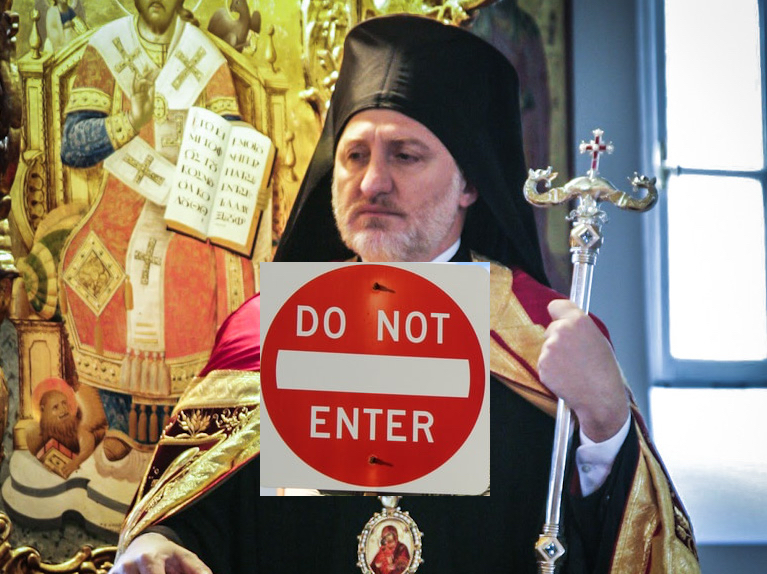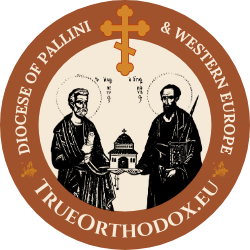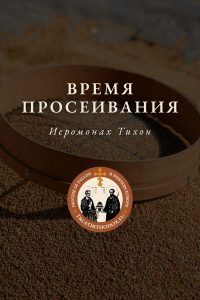Two Days Before the Church Celebrates the Restoration of the Veneration of the Holy Icons, “Archbishop” Elpidophoros of America Warns Against Venerating Icons!

AND THE 10 COMMANDMENTS OF “ARCHBISHOP” ELPIDOPHOROS TO HIS CLERGY
Two days before Orthodox everywhere celebrate the Sunday of Orthodoxy, which is firstly a celebration of the right to once again venerate Holy Icons after the iconoclast period, “Archbishop” Elpidophoros of America of the Greek Archdiocese sent out an encyclical concerning the coronavirus.
Read the encyclical but read at the end of this article the “10 Commandments” that “Archbishop” Elpidophoros gave to his clergy.
The encyclical reads like this:
March 6, 2020
To the Right Reverend Hierarchs, the Reverend Priests and Deacons, the Monks and Nuns, the Presidents and Members of the Parish Councils of the Greek Orthodox Communities, the Distinguished Archons of the Ecumenical Patriarchate, the Day, Afternoon, and Church Schools, the Philoptochos Sisterhoods, the Youth, the Hellenic Organizations, and the entire Greek Orthodox Family in America
Beloved Brothers and Sisters in Christ,
The appearance of the Covid-19 Pandemic (Coronavirus) throughout the world and in the United States has created fear, anxiety, and genuine concern. All of these need to be taken seriously and no one’s fears should be dismissed out of hand. Already, religious bodies are responding in similar ways, but ways that are not necessarily consistent. In order to assist the Faithful in their own response, this statement is meant to guide and inform us all.
As Orthodox Christians, we know that God uses material means to communicate His blessings and presence to us. The grace-filled presence of Icons, Relics, Holy Water, blessing crosses, objects (such as flowers), and even the blessing hand of a priest, convey to the believer God’s grace and energy.
The same material elements that can convey the blessings of God are also subject to the broken nature of our fallen world. Science and our God-given reason demand that we employ every means available to protect ourselves and our families against the spread of Covid-19 and any other disease. In a crisis such as this, we need to exercise vigilance as a community, lest our churches become points of transmission of the disease.
The sacrament of sacraments, the Holy Eucharist, is not simply a material element but the very body and blood of our Lord Jesus Christ.
Therefore, we counsel those feeling unwell physically to refrain from liturgical assemblies until they are certain of their diagnosis. Taking the basic steps of wellness as recommended by the health authorities is not only sensible, but wise and considerate of others. In truth, it is an act of love.
Clergy and Laity alike should employ best practices like thorough and meticulous hand-washing and frequent cleaning of the liturgical space and objects (e.g., hand cross, icons, etc.). Those belonging to vulnerable groups (the at-risk elderly, those with suppressed auto-immune systems, and those who suffer from chronic illnesses) should protect themselves by refraining from attending church services during the crisis. Also, everyone traveling internationally, please refrain from coming to church services for a period of fourteen days (the timeframe of incubation). Thanks to the marvels of technology, anyone can take full advantage of following services on the TV or the internet, and the clergy can visit them at home to administer the Sacraments.
In addition, no one should be criticized for making the choice to refrain for a time from their participation in the traditional liturgical practices of our Holy Church. These measures do not change the traditions of the Church but are rather temporary precautions during this time of crisis. We should strengthen one another, as the Apostle Paul says:
For God has not destined us for wrath, but to obtain salvation through our Lord Jesus Christ, Who died for us, so that whether we wake or sleep we might live with Him. Therefore, encourage one another and build one another up, just as you are doing. (I Thessalonians 5:9-11)
As we encourage and strengthen each other, let us also offer our prayers to the Lord our God, that this pandemic might end quickly, and that, through the prayers of His Holy Mother and Ever-Virgin Mary, He will, as we pray in our litanies of fervent supplication:
«… τοῦ διαφυλαχθῆναι τὴν ἁγίαν Ἐκκλησίαν καὶ τὴν πόλιν ταύτην, καὶ πᾶσαν πόλιν καὶ χώραν άπὸ λοιμοῦ….»
“… protect our Holy Church and our city and every city and land from pestilence….”
With paternal prayers and blessing in Christ,
Archbishop Elpidophoros of America
THE 10 COMMANDMENTS OF ELPIDOPHOROS
Directives to be followed by the Clergy dealing with Covid-19 (Coronavirus), until further notice, based on the instructions of the US Center for Disease Control (CDC)
1) All parishes will provide stations in the Narthex and/or Nave for the Faithful to disinfect their hands as they enter the Church.
2) Signs will be posted at the entrance that recommend sick persons not attend the Services, but participate via television or the Internet (URL should be posted as well)
3) The clergy will not offer their hands to be reverenced and will refrain from touching the faithful either through handshakes or an embrace.
4) Signs will be posted recommending that honor be shown to Icons and the blessing cross by only bowing.
5) No books – Liturgical or Scriptural, will be kept in the pews. Parishioners will be instructed to bring their own books from home.
6) The Faithful will not receive the Antidoron from the Clergy, but on their own as they leave the church.
7) In the case of the use of flowers (Sunday of the Veneration of the Cross, Palm Sunday, Holy Friday), the Faithful will take them on their own as they leave the church. On Holy Wednesday (Holy Unction), each priest will anoint each Faithful using separate cotton-tipped swabs.
8) The Eucharist will be distributed as per usual.
9) In concelebrations, the clerical “Kiss of Peace” will be through bowing to one another. In parishes where the laity exchange the “Kiss of Peace,” they will avoid contact through bowing to one another.
10) After every service, all liturgical objects and surfaces to be thoroughly cleaned.







